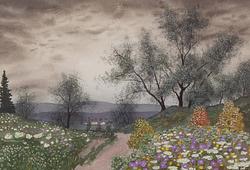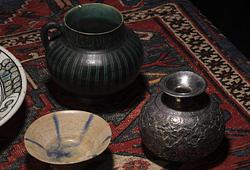Anna Petrus
A pair of pewter candlesticks, Herman Bergmans Konstgjuteri, Stockholm probably early 1920s.
Details of brass, signed Anna Petrus Herman Bergmans Konstgj. Height 24.5 cm.
Näyttelyt
The Worlds Fair in Paris 1925, this model was included.
New York, 1927, The Metropolitan Museum of Art. The model was included in the show called 'Swedish Contemporary Decorative Arts'.
Kirjallisuus
Marie Rehnberg, 'Anna Petrus Skulptör, industrikonstnär och pionjär' (2009), 2022, Arena Förlag, pp 82-83.
Hedvig Hedqvist, Rikard Jacobson, Jan von Gerber, 'Modernt Svenskt Tenn', 2004, p 21.
Gregor Paulsson (ed), Svenska Slöjdföreningens årsbok, 1926 (Yearbook for The Swedish Association of Crafts 1926), p 59, the model depicted together with an inkstand also designed by Anna Petrus.
Muut tiedot
ANNA PETRUS (1886-1949)
Anna Petrus is described as an independent person with a strong personality. She seems to have been a modern woman driven by passion for her work.
In her studio on Riddargatan in Stockholm, Anna Petrus began to take an interest in arts and crafts in the early 1920s. She began to create several different types of trays in different kinds of materials; pewter, copper and sometimes with elements of silver. The trays were provided with richly chiselled decoration and were sometimes combined with artistically carved oak lions. She continue with creating other works of art and collaborated with the foundry Herman Bergman to have her early models cast in pewter.
In 1922, Anna Petrus organized a show in her studio where she showed the tables she had created entirely herself, but also tables with a framework designed by Uno Åhrén. The latter were produced by Estrid Ericson and Firma Svenskt Tenn.
Anna Petrus was early on contracted to have some models to be launched and produced by Svenskt Tenn. Most of them are still being produced today.
Her design language was truly original, all but marked by the spirit of the times. The male lion was a motif that often returned in her designs. The lions she used in various contexts from the beginning of the 1920s until the 1930s differ from each other but are equally unmistakable designed by Anna Petrus.

















































